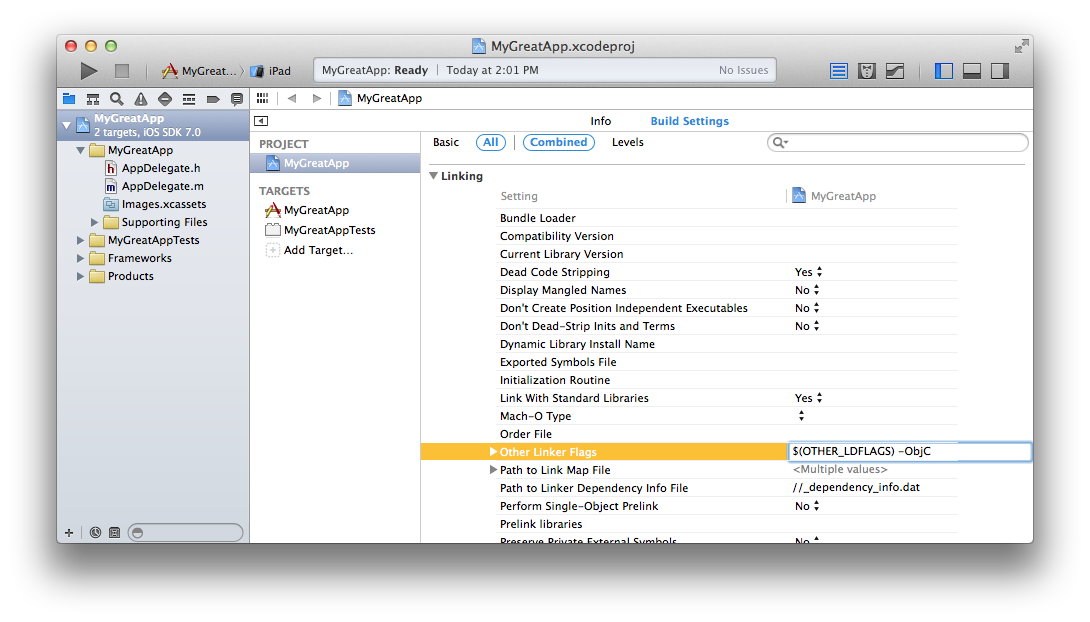Building Objective-C static libraries with categories
Q: How do I fix "selector not recognized" runtime exceptions when trying to use category methods from a static library?
A: If you're seeing a "selector not recognized" runtime exception when calling a category method that is implemented in a static library, you are hitting the link-time build issue described here, and need to add the -ObjC linker flag to your project, by following these steps:
In Xcode, choose View > Navigators > Show Project Navigator, or press
⌘1.Select your project under the PROJECT heading in the Project Navigator, then select the Build Settings tab.
Scroll down to the Other Linker Flags build setting under the Linking collection, or type "Other Linker Flags" into the search bar.
Set the value of the Other Linker Flags build setting to
$(OTHER_LDFLAGS) -ObjC.


Troubleshooting
If adding the -ObjC flag isn't fixing the problem, double check that a conflicting Target build setting is not overriding it, by following the above steps, but selecting the current target under "TARGETS" in step 2, instead of the project.
Other Causes of selector not recognized Exceptions
The most common causes of a "selector not recognized" exception are:
No Such Method
The method really does not exist. Check your spelling. Check documentation to verify that the method exists on the version of the operating system your app is using.
Memory Management
Your app is trying to use an object after it has been deallocated, use the Zombies instrument to debug this kind of problem. You are seeing "selector not recognized" because the memory has been re-allocated as a different kind of object.
What causes those exceptions?
An impedance mismatch between UNIX static libraries and the dynamic nature of Objective-C can cause category methods in static libraries to not be linked into an app, resulting in "selector not recognized" exceptions when the methods aren't found at runtime.
The Linker
When a C program is compiled, each "source file" is turned into an "object file" that contains executable functions and static data. The linker glues these object files together into a final executable. That executable is eventually bundled into an app by Xcode.
When a source file uses something (like a function) defined in another file, then an undefined symbol is written into the object file, to "stand in" for the missing thing. The linker resolves these symbols by pulling in the object files that include definitions of undefined symbols when building the final executable.
For example, if main.c uses the function foo(), where foo is defined in another file, B.c, then the object file main.o will have an unresolved symbol for foo(), and B.o will include an implementation of foo(). At link time, B.o will be brought into the final executable, so that the code in main.o now references the implementation of foo() defined in B.o.
A UNIX static library is just a collection of object files. Normally the linker only pulls in an object file from a static library if doing so would resolve some undefined symbol. Not pulling in all object files reduces the size of the final executable.
Objective-C
The dynamic nature of Objective-C complicates things slightly. Because the code that implements a method is not determined until the method is actually called, Objective-C does not define linker symbols for methods. Linker symbols are only defined for classes.
For example, if main.m includes the code [[FooClass alloc] initWithBar:nil]; then main.o will contain an undefined symbol for FooClass, but no linker symbols for the -initWithBar: method will be in main.o.
Since categories are a collection of methods, using a category's method does not generate an undefined symbol. This means the linker does not know to load an object file defining the category, if the class itself is already defined. This causes the same "selector not recognized" runtime exception you would see for any unimplemented method.
The -ObjC Linker Flag
Passing the -ObjC option to the linker causes it to load all members of static libraries that implement any Objective-C class or category. This will pickup any category method implementations. But it can make the resulting executable larger, and may pickup unnecessary objects. For this reason it is not on by default.
Document Revision History
| Date | Notes |
|---|---|
| 2014-08-05 | Removed discussion of workarounds that are unnecessary in Xcode 4 and later. Added pointers to more common causes of 'selector not recognized' errors. |
| 2010-04-30 | Describes how to pass the "-ObjC" option to the linker. Updated for Mac OS X v10.6 and later. |
| 2006-10-03 | Changed "and" to "an" in order to make the content correct. |
| 2006-09-25 | New document that describes how to properly build Objective-C static libraries that contain categories on existing classes. |
Copyright © 2014 Apple Inc. All Rights Reserved. Terms of Use | Privacy Policy | Updated: 2014-08-05